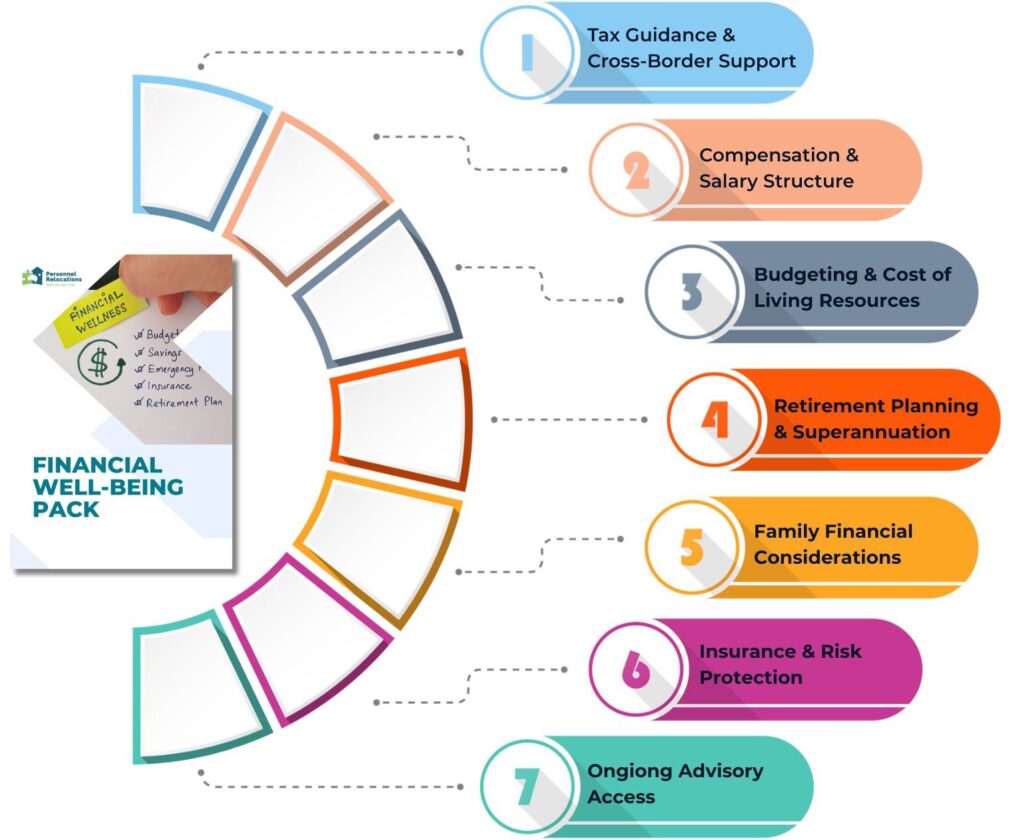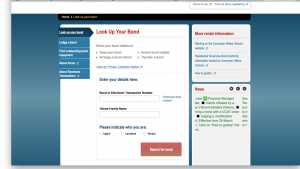There are many pressure points during a relocation.
Family matters — from those being left behind to those travelling with your employee — finding a home, a school, settling into a new routine and navigating a new role with new expectations are all stressful.
But one of the biggest stressors? Financial uncertainty.
It’s often underestimated, but financial stress can have a profoundly negative impact. Unexplained costs, fluctuating exchange rates, and too many unknowns all take a toll, both personally and professionally, when weighing up the decision to move.
The financial well-being of your relocating employee might not seem like a corporate responsibility, but it is. It might feel like something outside your control, but it’s not.
Because an employee preoccupied with money worries is distracted, their focus, well-being, and performance all suffer.
We must also remember that employees relocating to Australia are stepping into the unknown. Everything familiar to you is foreign to them.
The cost of living, the healthcare system, and payroll are all unfamiliar territories.
But knowledge is power. Once they understand how things work, it won’t feel so overwhelming anymore.
How can you help?
Over the years, I have seen how a simple one-hour consultation or a template immediately relaxes a relocator. They know what is “normal” and they won’t have to ask a silly question.
There are many subtle differences you can make; everyday events that might seem silly to explain can go a long way in educating and therefore calming your employee. Empower them and manage their expectations by providing a financial toolkit. Here are some tips that I have found to be effective.
Provide a dummy payslip

A dummy payslip can go a long way in helping your relocating employee understand what their actual take-home salary will be. It clearly lays out the deductions, so they’re not caught off guard.
This is incredibly helpful when planning, especially for items such as rental budgets.
Did you know that estate agents generally expect rent to be no more than 30% of your salary? If your employee is coming over on the minimum visa salary, there’s a good chance they won’t easily get approved for a rental. All too often, when I explain this to a relocator, they become slightly panicked because they have no idea what their take-home salary will be. Of course, I am quick to reassure, and we work out other ways to satisfy the estate agents.
That’s why we also provide a Cost of Living calculator to give your employees a real sense of what life in Australia might cost them and help them plan accordingly.
Explain healthcare and superannuation

Ensuring your employees understand how their healthcare works — including limits, rebates, and any additional benefits they or their family may be entitled to — is essential.
The same goes for their superannuation. Do they know what’s being contributed and what their options are to grow it? A little knowledge here can go a long way in helping them feel more in control of their finances.
Offer tax consultation

In Australia, it’s widely accepted that most corporates offer their expats a tax consultation as part of the relocation package.
Compliance often drives this because if an employee misunderstands local tax obligations, the company can be held accountable.
But beyond compliance, this consultation is incredibly valuable. Many expats have multiple income streams across different countries, and a good tax briefing helps them understand Australia’s tax system, along with any double taxation agreements that may apply.
Prepare a relocation booklet

When relocating families to Australia, managing expectations is the biggest challenge in our work. This is mainly due to the sheer volume of information that needs to be shared and the timing of when it’s shared.
I’m acutely aware of how people digest information. We can explain the processes clearly, but details can get lost or forgotten during a busy move. That’s why having a booklet or information pack that your employees can refer back to is valuable — something they can check when needed, in their own time.
Remember, the relocation process involves a lot: furniture removals, customs forms, export paperwork, accommodation bookings, reference numbers, and more.
And bubbling away in the background, often just below the surface, is financial worry.
So why not create a Financial Wellbeing Kit?
It doesn’t need to be complicated — just a few key resources that can make a big difference:
- Key contact people — both in your organisation and outside it
- Payroll and healthcare provider details
- Recommended financial advisers and/or expat tax experts
- A Cost of Living Calculator
- A breakdown of their relocation budget, including how to claim reimbursements
Sometimes, these simple tools make employees feel more supported, more confident, and more able to focus on settling in.
Template for Financial Well-Being Pack
Here’s what a comprehensive, practical, and people-first financial well-being pack could look like for employees relocating to Australia:
Tax Guidance and Cross-Border Support
Tax obligations are one of the most complex and stressful aspects of relocation. Early and accurate advice can prevent costly errors and reduce anxiety.
Key components to include:
- Personal tax consultations in both the home and host countries
- Clear explanation of Australian tax residency rules and what they mean in practice
- Guidance on double taxation agreements and how to avoid duplicate liabilities
- Company policy clarification on tax equalisation or tax protection, if applicable
- Annual tax return support, including advisory or reimbursement
Transparent Compensation and Salary Structuring
Clarity around income and entitlements ensures that employees can plan effectively and feel secure in their financial transition.
This section should provide:
- Comprehensive breakdown of the full compensation package, including:
- Base salary
- Relocation and hardship allowances
- Performance-related bonuses
- Superannuation contributions
- Currency conversion details and explanation of exchange rate processes
- Payment frequency, method, and banking logistics
- Information on salary reviews and cost-of-living adjustments
Budgeting and Cost of Living Resources
Adapting to a new economic environment can be overwhelming, especially when the cost of everyday life differs significantly from what employees are used to. Proactive tools and resources can help them manage the transition more confidently.
Recommended inclusions:
- Comparative cost of living analysis between the home and host countries
- Budgeting tools, templates, or access to financial planning platforms
- Corporate partnerships or negotiated discounts for housing, transport, and insurance
- Practical guidance on setting up local banking and managing foreign accounts
Retirement Planning and Superannuation
Relocation can disrupt long-term financial planning if not addressed early. Helping employees understand their retirement options ensures continuity in their financial journey.
This support should include:
- Introduction to Australia’s superannuation system and contribution obligations
- Explanation of eligibility and withdrawal rules for departing expatriates
- Cross-border retirement planning resources and advisory support
- Investment options and restrictions for temporary or non-resident workers
Family Financial Considerations
Relocation affects more than just the individual—it impacts the entire family unit. Financial well-being support should consider the broader needs of dependents and spouses to foster long-term stability.
Areas to cover:
- Overview of healthcare costs, Medicare access, and private health insurance
- Partner employment guidance, including tax and visa implications of dual incomes
- Information on childcare costs, rebates, and available subsidies
- Financial support for education, schooling, and dependent care
Insurance and Risk Protection
A comprehensive insurance strategy gives employees peace of mind in unfamiliar settings. Knowing they are protected—both legally and financially—reduces one of the major sources of relocation anxiety.
This section should detail:
- Overview of required insurance (health, motor vehicle, property, liability)
- Guidance on optional protections, such as income protection and life insurance
- Access to vetted insurance providers and support with enrollment
Ongoing Financial Education and Advisory Access
Financial well-being isn’t a one-time conversation. It’s an ongoing process. Continued access to resources and advice allows employees to adapt and make informed decisions as their needs evolve.
To support long-term success, offer:
- Financial wellness webinars, seminars, or training sessions tailored for expatriates
- Annual financial check-ins with qualified advisors
- Curated digital resources, including ATO publications, relocation guides, and expat community platforms
- Optional access to trusted financial literacy tools or subscriptions (e.g. MyBudget, Barefoot Investor)
Offering this level of support will help your employee settle in, focus on their new job and most importantly, feel cared for and connected from the start.

How can Personnel Relocations help?
We offer a comprehensive concierge service to reduce financial uncertainty for your relocating employees. From day one, they’ll have direct access to expert guidance and reliable service providers—all coordinated through a single point of contact.
Whether your employee needs tax advice, financial planning, budgeting tools, insurance support, or assistance navigating Australia’s superannuation system, we can connect them with the right professionals.
Our consultation services go beyond general advice. We provide practical, tailored support to help your employees make informed decisions about managing their finances in a new and unfamiliar environment.
By partnering with us, you ensure your employees are supported holistically so they can focus on their new role and make the right start.







